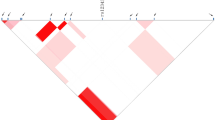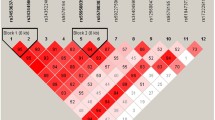Abstract
Tumor necrosis factor superfamily member 4 (TNFSF4) plays a key role in the process of atherosclerosis, a common risk factor for both myocardial and cerebral infarctions. Recent studies indicate that the single nucleotide polymorphism (SNP) rs3850641 in TNFSF4 is associated with higher risk of myocardial infarction, but little is known about the association between TNFSF4 variation and cerebral infarction (CI). A case-control study involving 385 CI patients and 385 age-matched, sex-matched non-CI controls was conducted in a Chinese population, only the most common subtype, atherosclerosis CI, was recruited. Two SNPs of TNFSF4, rs3850641 and rs3861950, were genotyped by the TaqMan SNP genotyping method, and verified partly by genomic DNA sequencing. The results revealed a significant allelic association between rs3861950 and CI (Odds ration = 1.733, 95 % confidence interval = 1.333–2.254, P = 0.000). Genotypic association analysis demonstrated that the CC genotype of rs3861950 confers susceptibility to CI (Odds ration = 2.896, 95 % confidence interval = 1.368–6.132), and it was associated with a significantly higher risk of ischemic stroke (Odds ration = 3.520, 95 % confidence interval = 1.546–8.015, P = 0.003) after adjusting for the other confirmed risk factors such as the history of hypertension, diabetes, CAD, smoking and alcohol drinking. While the odds ratio of the T allele to the C allele was 1.733 (95 % confidence interval: 1.333–2.254). However, there was no significant association between rs3850641 and CI (Odds ration = 1.288, 95 % confidence interval = 0.993–1.670, P = 0.056). TNFSF4 gene polymorphism rs3861950, but not rs3850641, is associated with the risk of atherosclerosis CI in a Chinese population.
Similar content being viewed by others
References
Humphries SE, Morgan L (2004) Genetic risk factors for stroke and carotid atherosclerosis: insights into pathophysiology from candidate gene approaches. Lancet Neurol 3:227–235
Dichgans M (2007) Genetics of ischemic stroke. Lancet Neurol 6:149–161
Tonk M, Haan J (2007) A review of genetic causes of ischemic and hemorrhagic stroke. J Neurol Sci 257:273–279
Schonbeck U, Libby P (2001) CD40 signaling and plaque instability. Circ Res 89:1092–1103
Lo JC, Wang Y, Tumanov AV, Bamji M, Yao Z, Reardon CA, Getz GS, Fu YX (2007) Lymphotoxin beta receptor-dependent control of lipid homeostasis. Science 316:285–288
Scholz H, Sandberg W, Damas JK, Smith C, Andreassen AK, Gullestad L, Froland SS, Yndestad A, Aukrust P, Halvorsen B (2005) Enhanced plasma levels of LIGHT in unstable angina: possible pathogenic role in foam cell formation and thrombosis. Circulation 112:2121–2129
Olofsson PS, Soderstrom LA, Wagsater D, Sheikine Y, Ocaya P, Lang F, Rabu C, Chen L, Rudling M, Aukrust P, Hedin U, Paulsson-Berne G, Sirsjo A, Hansson GK (2008) CD137 is expressed in human atherosclerosis and promotes development of plaque inflammation in hypercholesterolemic mice. Circulation 117:1292–1301
Croft M, Duan W, Choi H, Eun SY, Madireddi S, Mehta A (2012) TNF superfamily in inflammatory disease: translating basic insights. Trends Immunol 33:144–152
Cha J-K, Jeong M-H, Jang J-Y, Bae H-R, Lim Y-J, Kim JS, Kim S-H, Kim JW (2003) Serial measurement of surface expressions of CD63, P-Selectin and CD40 ligand on platelets in atherosclerotic ischemic stroke––a possible role of CD40 ligand on platelets in atherosclerotic ischemic stroke. Cerebrovasc Dis 16:376–382
Matijevic N, Wu KK, Howard AG, Wasserman B, Wang WY-W, Folsom AR, Sharrett AR (2011) Association of blood monocyte and platelet markers with carotid artery characteristics: the atherosclerosis risk in communities carotid MRI study. Cerebrovasc Dis 31:552–558
Wang X, Ria M, Kelmenson PM, Eriksson P, Higgins DC, Samnegard A, Petros C, Rollins J, Bennet AM, Wiman B, de Faire U, Wennberg C, Olsson PG, Ishii N, Sugamura K, Hamsten A, Forsman-Semb K, Lagercrantz J, Paigen B (2005) Positional identification of TNFSF4, encoding OX40 ligand, as a gene that influences atherosclerosis susceptibility. Nat Genet 37:365–372
Ria M, Eriksson P, Boquist S, Ericsson CG, Hamsten A, Lagercrantz J (2006) Human genetic evidence that OX40 is implicated in myocardial infarction. Biochem Biophys Res Commun 339:1001–1006
Olofsson PS, Söder ström LA, Jern C, Sirsjö A, Ria M, Sundler E, de Faire U, Wiklund PG, Öhrvik J, Hedin U, Paulsson-Berne G, Hamsten A, Eriksson P, Hansson GK (2009) Genetic variants of TNFSF4 and risk for carotid artery disease and stroke. J Mol Med 87:337–346
Koch W, Hoppmann P, Mueller JC, Schömig A, Kastrati A (2008) Lack of support for association between common variation in TNFSF4 and myocardial infarction in a German population. Nat Genet 40:1386–1387
Chen Y, Zhang L, Huang H, Liu R, Li X, Qiang O, Zeng Z (2011) Association of OX40 and OX40L gene polymorphisms with acute coronary syndrome in a Han Chinese population. DNA Cell Biol 30:597–602
Cheng G, Wang H, Chen M, Li L, Gong Y, Liu Q (2011) Lack of evidence to support the association of polymorphisms within the TNFSF4 gene and coronary heart disease in a Chinese Han population. Exp Ther Med 2:275–280
Yamaguchi S, Yamada Y, Metoki N, Yoshida H, Satoh K, Ichihara S, Kato K, Kameyama T, Yokoi K, Matsuo H, Segawa T, Watanabe S, Nozawa Y (2006) Genetic risk for atherothrombotic cerebral infarction in individuals stratified by sex or conventional risk factors for atherosclerosis. Int J Mol Med 18:871–883
Adams HP Jr, Bendixen BH, Kappelle LJ, Biller J, Love BB, Gordon DL, Marsh EE (1993) Classification of subtype of acute ischemic stroke. Definitions for use in a multicenter clinical trial. TOAST. Trial of Org 10172 in acute stroke treatment. Stroke 24:35–41
Han SW, Kim SH, Lee JY, Chu CK, Yang JH, Shin HY, Nam HS, Lee BI, Heo JH (2007) A new subtype classification of ischemic stroke based on treatment and etiologic mechanism. Eur Neurol 57:96–102
Helgadottir A, Manolescu A, Thorleifsson G, Gretarsdottir S, Jonsdottir H, Thorsteinsdottir U, Samani NJ, Gudmundsson G, Grant SF, Thorgeirsson G, Sveinbjornsdottir S, Valdimarsson EM, Matthiasson SE, Johannsson H, Gudmundsdottir O, Gurney ME, Sainz J, Thorhallsdottir M, Andresdottir M, Frigge ML, Topol EJ, Kong A, Gudnason V, Hakonarson H, Gulcher JR, Stefansson K (2004) The gene encoding 5-lipoxygenase activating protein confers risk of myocardial infarction and stroke. Nat Genet 36:233–239
Olofsson PS, Jatta K, Wagsater D, Gredmark S, Hedin U, Paulsson-Berne G, Soderberg-Naucler C, Hansson GK, Sirsjo A (2005) The antiviral cytomegalovirus inducible gene 5/viperin is expressed in atherosclerosis and regulated by pro-inflammatory agents. Arterioscler Thromb Vasc Biol 25:e113–e116
Acknowledgments
This study was supported by grant 07JJ3052 from the Hunan Natural Science Foundation. We are particularly grateful to State Key Laboratory of Medical Genetics, Central South University.
Author information
Authors and Affiliations
Corresponding author
Rights and permissions
About this article
Cite this article
Feng, J., Liu, YH., Yang, QD. et al. TNFSF4 gene polymorphism rs3861950 but not rs3850641 is associated with the risk of cerebral infarction in a Chinese population. J Thromb Thrombolysis 36, 307–313 (2013). https://doi.org/10.1007/s11239-012-0849-9
Published:
Issue Date:
DOI: https://doi.org/10.1007/s11239-012-0849-9




